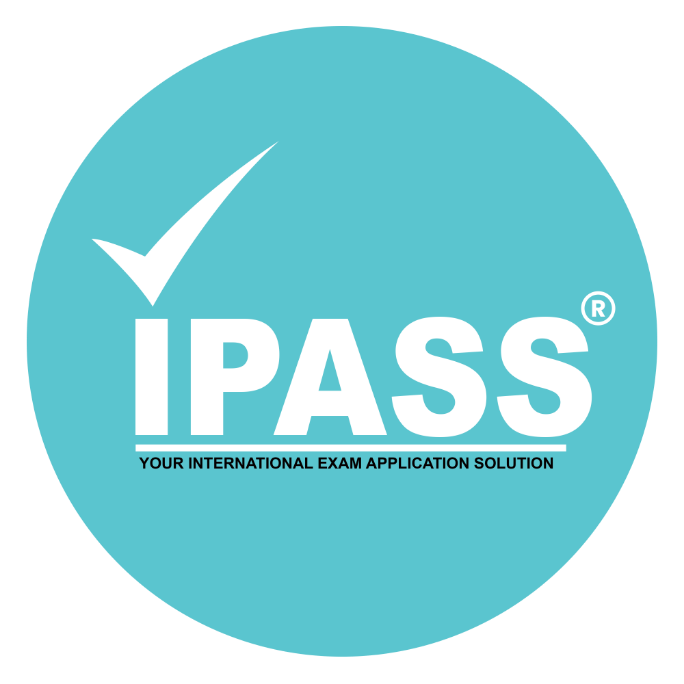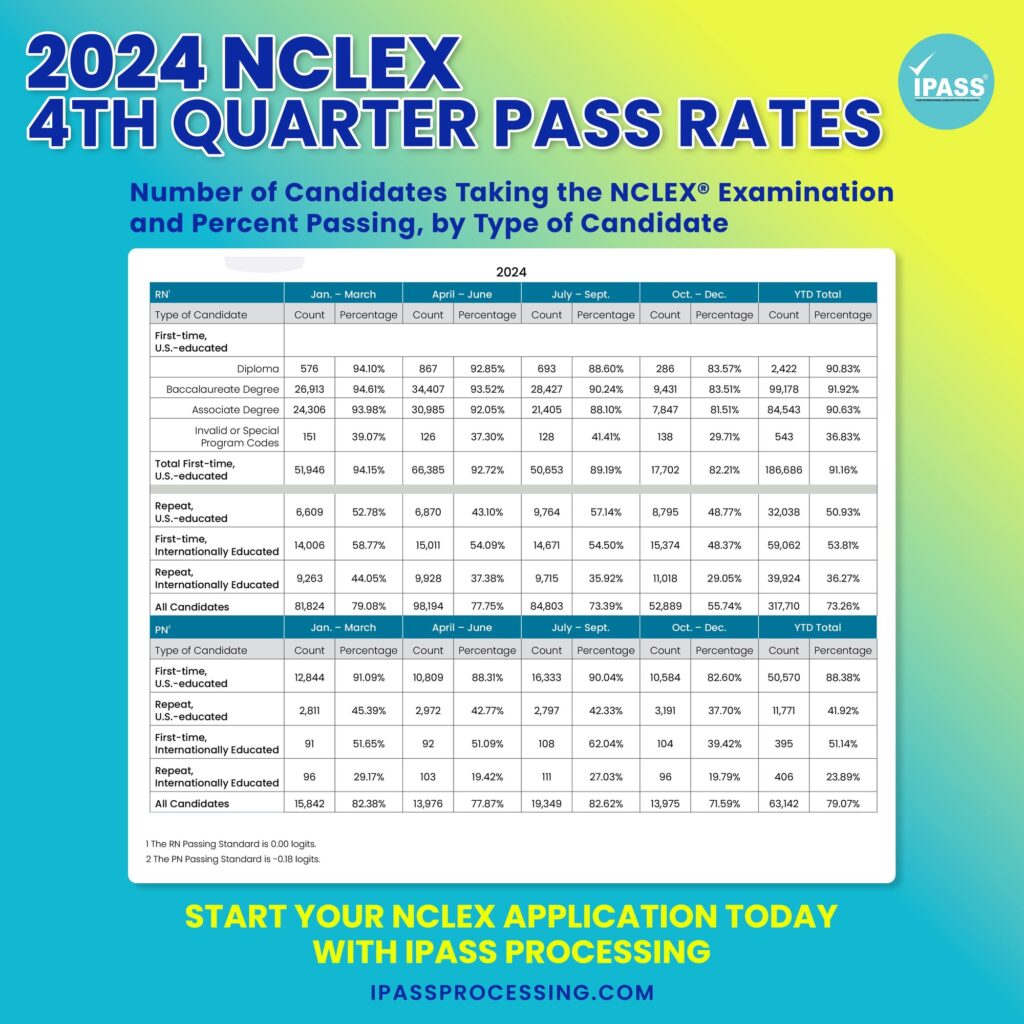Your cart is currently empty!

NCLEX Pass Rates 2024: Key Insights You Need to Know
(Estimated Reading Time: 11 minutes)
The National Council Licensure Examination (NCLEX) serves as the gateway to the nursing profession in the United States. As we review the data from NCLEX Pass Rates 2024, several notable trends have emerged that impact nursing education, workforce development, and the future of healthcare staffing.
This comprehensive analysis breaks down the most recent NCLEX statistics from the National Council of State Boards of Nursing (NCSBN), providing vital insights for aspiring nurses that would want to be licensed internationally.
2024 NCLEX Pass Rates: A Comprehensive Overview
The 2024 NCLEX data reveals significant patterns in NCLEX performance across all candidate categories. For the NCLEX-RN, the year-to-date (YTD) pass rate through Q4 2024 was 73.26% across all candidate types, with a total of 317,710 candidates taking the exam. For the NCLEX-PN, the overall pass rate was higher at 79.07%, with 63,142 candidates tested.
Looking more closely at first-time test takers, who typically represent new graduates entering the workforce:
- First-time RN candidates achieved an 82.19% pass rate (245,748 total candidates)
- First-time PN candidates achieved an 88.09% pass rate (50,965 total candidates)
These statistics indicate that while the majority of new nursing graduates successfully pass the NCLEX on their first attempt, a significant percentage still face challenges that require additional preparation and retesting.
Quarterly NCLEX Pass Rates Analysis for 2024
A detailed quarterly breakdown reveals noteworthy patterns throughout 2024:
NCLEX-RN Quarterly Pass Rates:
- Q1 (Jan-Mar): 79.08%
- Q2 (Apr-Jun): 77.75%
- Q3 (Jul-Sep): 73.39%
- Q4 (Oct-Dec): 55.74%
NCLEX-PN Quarterly Pass Rates:
- Q1 (Jan-Mar): 82.38%
- Q2 (Apr-Jun): 77.87%
- Q3 (Jul-Sep): 82.62%
- Q4 (Oct-Dec): 71.59%
The most striking observation is the significant decline in pass rates during Q4 2024 for both RN and PN candidates. This downward trend warrants further investigation, as it could reflect changes in exam difficulty, shifts in educational preparation, or other factors affecting candidate performance.
Breaking Down the 2024 NCLEX RN Pass Rates
The NCSBN data shows varied NCLEX RN results by quarter. Some quarters have lower pass rates and fewer test-takers, while others show higher pass rates and more candidates. These changes require further study to understand the variations in nursing exam outcomes. Here are some of the facts that we need to consider:
First-time vs. Repeat Test Takers
The data shows a substantial difference in success rates between first-time and repeat test takers for the NCLEX-RN:
- First-time RN candidates: 82.19% pass rate
- Repeat RN candidates: 42.80% pass rate
This nearly 40-percentage-point gap highlights the challenges faced by those who must retake the examination. The significantly lower pass rates for repeat test takers suggest that additional targeted interventions and preparation strategies may be needed for this population.
U.S.-Educated vs. Internationally Educated Candidates
Origin of education has a profound impact on NCLEX-RN success rates:
- U.S.-educated candidates: 85.27% pass rate (218,724 candidates)
- Internationally educated candidates: 46.74% pass rate (98,986 candidates)
This substantial disparity likely reflects differences in nursing education curricula, language barriers, unfamiliarity with U.S. nursing practices, and variations in clinical training experiences.
With internationally educated nurses comprising nearly one-third of the total RN candidate pool in 2024, addressing these disparities is critical for supporting global nursing mobility and alleviating nursing shortages.
International Candidates and NCLEX Performance
The 2024 data identifies the primary sources of internationally educated nurses seeking U.S. licensure:

- Philippines: 28,258 candidates (approximately 29% of all international candidates)
- India: 5,869 candidates
- Kenya: 3,740 candidates
- Nepal: 2,662 candidates
- South Korea: 2,636 candidates
These five countries alone account for over 43,000 nursing candidates, highlighting the global nature of the U.S. nursing workforce pipeline. The Philippines continues its long-standing tradition as the leading source of internationally educated nurses seeking U.S. licensure.
Success Rates Among International Candidates
While the overall pass rate for internationally educated RN candidates was 46.74%, first-time international candidates performed better at 53.81%. However, this success rate still lags significantly behind the 91.16% pass rate for first-time U.S.-educated RN candidates.
Quarterly trends for first-time internationally educated RN candidates show a concerning pattern:
- Q1: 58.77%
- Q2: 54.09%
- Q3: 54.50%
- Q4: 48.37%
This downward trend parallels the overall decline in Q4 performance but suggests that international candidates may face additional or unique challenges as the year progresses.
Key Factors Affecting NCLEX Pass Rates in 2024
The data clearly demonstrates that educational preparation significantly influences NCLEX success. Candidates from U.S. nursing programs consistently outperform their international counterparts, and first-time test takers have substantially higher pass rates than repeat candidates.
Several factors may contribute to these disparities:
- Alignment between curriculum content and NCLEX test plan
- Familiarity with the computerized adaptive testing format
- Access to comprehensive preparation resources
- English language proficiency for non-native speakers
- Differences in clinical practice experiences
Educational institutions might use these insights to develop targeted support strategies, especially for student populations that typically experience lower pass rates.
Strategies for NCLEX Success Based on 2024 Data
Given the patterns observed in the 2024 NCLEX data, several evidence-based strategies emerge as particularly valuable for prospective nursing candidates:
- Comprehensive Content Review
Focus on systematically reviewing all content areas, with special attention to frequently tested topics.
- Practice with Adaptive Testing
Familiarize yourself with the computerized adaptive testing format through practice exams that mimic the actual NCLEX experience.
- Targeted Remediation for Repeat Test-Takers
Identify and address specific knowledge gaps rather than simply reviewing all content areas equally.
- Cultural and Language Support for International Candidates
Access resources specifically designed to bridge cultural differences in nursing practice and enhance technical language proficiency.
- Strategic Test-Taking Skills
Develop strategies for analyzing and responding to NCLEX-style questions, including those requiring clinical judgment and critical thinking.
- Stress Management and Wellness
Incorporate stress reduction techniques and maintain physical wellness during the preparation period.
- Timing Considerations
When possible, schedule the examination during quarters that historically show higher pass rates (Q1-Q3 based on 2024 data).
Educational institutions and licensing boards can support these strategies through targeted programs, especially for candidate populations that show lower pass rates in the statistical data.
2023 vs 2024 NCLEX Pass Rates Comparison
Overall examination volume saw a notable decrease in 2024, with 317,710 RN candidates compared to 358,998 in 2023—representing an 11.5% reduction. Despite this decline in participation, success rates improved markedly. The overall RN pass rate climbed from 69.96% in 2023 to 73.26% in 2024, while practical nursing (PN) candidates experienced an even more substantial improvement, with pass rates increasing from 74.54% to 79.07%.
First-time test takers continued to outperform repeat candidates across both years. In 2024, first-time RN candidates achieved an 82.19% pass rate, up from 79.16% the previous year. Similarly, first-time PN candidates showed excellent performance with 88.09% passing in 2024, compared to 86.39% in 2023.
Educational background remained a significant factor in examination outcomes. US-educated RN candidates demonstrated stronger performance in 2024, with pass rates increasing from 79.60% to 85.27%. Internationally educated nurses, however, faced persistent challenges, with their pass rates slightly decreasing from 48.28% to 46.74% for RN candidates and from 40.15% to 37.33% for PN candidates.
The quarterly performance analysis reveals a particularly striking improvement in first-quarter results for 2024, with RN pass rates jumping from 57.79% in 2023 to 79.08%. However, this trend did not continue throughout the year, with fourth-quarter 2024 results showing the lowest pass rates of any quarter at 55.74%.
International candidate demographics continued to be dominated by nurses from the Philippines, though their total numbers decreased from 36,410 in 2023 to 28,258 in 2024. India maintained its position as the second-largest source of international nursing candidates, while Kenya showed remarkable growth, moving from fourth to third place with an increase to 3,740 candidates in 2024. South Korea, Nepal, and Nigeria rounded out the top contributors, with some shifting in their relative rankings.
The improved pass rates despite decreased testing volumes may indicate enhanced educational preparation, curriculum adjustments, or changes in testing standards. Meanwhile, the declining number of international candidates could reflect shifting immigration policies or global healthcare workforce dynamics in the post-pandemic era.
Ace Your Next-Gen NCLEX Review With IPASS’ Comprehensive Support
In today’s competitive healthcare landscape, the extended Visa processing times in the United States make first-attempt NCLEX success more crucial than ever. IPASS Processing doesn’t just offer an NCLEX review—we deliver a comprehensive pathway to your career as a US Registered Nurse with unparalleled efficiency and support.
Why settle for multiple attempts when you can excel on your first try? Our mission is simple yet powerful: to optimize your valuable resources—time, money, and effort—ensuring nothing is wasted during your NCLEX preparation journey.
With application fees continuing to rise, we understand the financial pressure you face. That’s why we’ve crafted an all-inclusive program that transforms exam preparation into career advancement.
- UNLIMITED NEXT-GEN NCLEX ACCESS until you pass—our commitment to your success
- 316 HOURS of high-yield, focused Next-Gen NCLEX content
- 24/7 ON-DEMAND ACCESS to all class recordings—study on your schedule
- COMPREHENSIVE ASSESSMENT SYSTEM with four strategic exams to track your progress
- 4,100+ PRACTICE QUESTIONS including 1,418 Next-Gen and 2,700 traditional formats
- PERSONALIZED 1-ON-1 MENTORSHIP from practicing USRNs who understand today’s healthcare realities
- Exclusive Roadmap to NCLEX book that was published by our very own Nurse Jay Padong, the esteemed Lead NCLEX Educator of IPASS Processing and Mentoring Academy.
- Our US-based NCLEX Educators provide valuable perspectives on the current US healthcare system. Additionally, we offer insights from educators located internationally.
- You may visit our IPASS Next-Gen NCLEX Online Review and Mentoring Academy service page for more details.
What truly sets IPASS Processing apart is our holistic approach. We don’t just prepare you for an exam—we prepare you for excellence in America’s evolving healthcare environment. Our evidence-based methodologies align with current US nursing standards, ensuring you develop not just theoretical knowledge but practical skills demanded by modern healthcare employers.
Choose IPASS Processing and transform your NCLEX preparation into a strategic career investment. Your future in US nursing begins with passing the NCLEX on your first attempt—and we’re here to make that happen.
Future Outlook of NCLEX based on the NCLEX Pass Rates 2024
The 2024 NCLEX pass rate data provides valuable insights into the current state of nursing education and licensure in the United States. While overall pass rates remain relatively strong, particularly for first-time U.S.-educated candidates, the significant decline in Q4 performance and the persistent gaps between different candidate populations highlight areas requiring attention.
Looking ahead, continued monitoring of these trends will be essential for nursing educators, regulatory bodies, and healthcare systems. By understanding the factors influencing NCLEX performance and implementing targeted interventions, stakeholders can work collaboratively to strengthen the nursing pipeline and ensure that qualified nursing professionals continue to enter the workforce at rates sufficient to meet growing healthcare demands.
Ready to pass the NCLEX on your first try? IPASS Processing’s NCLEX Online Review and Mentoring Academy provides the targeted preparation and personalized support you need to succeed. Don’t become part of the declining pass rate statistics—join our program and start your nursing career with confidence.
FAQs About 2024 NCLEX Pass Rates
1. What was the overall pass rate for the NCLEX-RN in 2024?
The overall pass rate for all NCLEX-RN candidates in 2024 was 73.26%, representing 317,710 total test takers. For first-time candidates specifically, the pass rate was significantly higher at 82.19%.
2. Why did NCLEX pass rates decline so dramatically in Q4 2024?
While the exact causes require further investigation, potential factors include changes in exam difficulty, seasonal variations in candidate preparation, differences in graduate cohorts, or adjustments to passing standards. The decline was observed across all candidate categories, suggesting systematic rather than isolated factors.
3. How did U.S.-educated nurses perform compared to internationally educated nurses?
U.S.-educated candidates significantly outperformed their internationally educated counterparts. For RN candidates, U.S.-educated nurses achieved an 85.27% pass rate compared to 46.74% for internationally educated nurses. Similar disparities were observed among PN candidates.
4. Which countries contributed the most internationally educated nurse candidates in 2024?
The Philippines led by a substantial margin with 28,258 candidates, followed by India (5,869), Kenya (3,740), Nepal (2,662), and South Korea (2,636). These five countries represented the majority of internationally educated candidates seeking U.S. nursing licensure.
5. What type of nursing educational program had the highest NCLEX-RN pass rates in 2024?
Among first-time, U.S.-educated RN candidates, those from baccalaureate degree programs had the highest pass rate at 91.92%, followed closely by diploma programs (90.83%) and associate degree programs (90.63%). While the differences were small, they suggest a slight advantage for baccalaureate-prepared candidates.
Recommended Reads
- Pass the NCLEX with Confidence – Join IPASS NCLEX Review 18th Cycle
- NCLEX Pass Rates 2024: Key Insights You Need to Know
- May 2025 PNLE Results: Top Schools & Topnotchers
- Ace the May 2025 PNLE: Final Week Preparation Tips
- Nursing Job Opportunities in the Philippines for USRNs
Recommended Topics
- ASCPi (1)
- Australia (8)
- Canada (5)
- Exam Tips (28)
- General (120)
- IPASS Events (10)
- IPASS News (129)
- Middle East Nursing (17)
- NCLEX (65)
- New Zealand (3)
- NMBI Ireland (1)
- Online Review (13)
- PNLE Online Review (3)
- Tourist Visa (1)
- UKNMC (1)
- US Nursing (12)
- UWorld (1)
- VisaScreen (3)











Leave a Reply